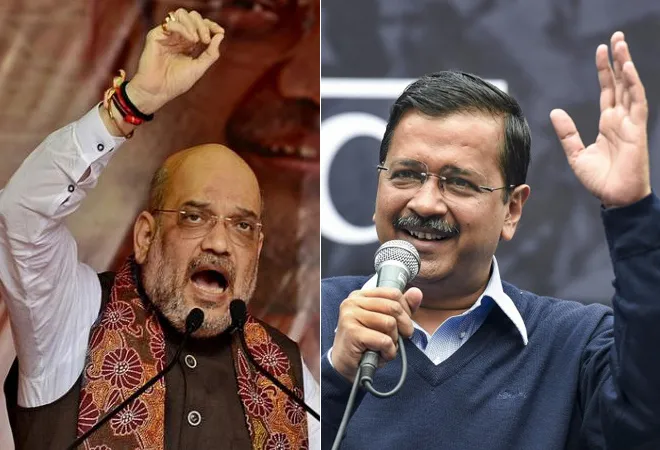
Hate seems to be the new currency of politics as it is not only in demand in India but across the world. One witnessed its interplay at the national capital during the assembly elections, it was written large also far away on the faces of US President Donald Trump and Speaker of the United States House of Representatives Nancy Pelosi when the former chose to ignore the latter’s outstretched hand when he walked into the House chamber on Tuesday (4 February) night to deliver the State of the Union (SOTU) address.
Pelosi, leader of the Democratic Party, was no less in her retort when she chose to tear rather shred into pieces a copy of Trumps SOTU triggering an intense debate on social media and TV shows which reflected the real picture of the often claimed title of the oldest democracy of the world, though the claim is often disputed but nevertheless the US has never been hesitant to lay claims on.
The SOTU, once so revered and much awaited event, turned out to be a clash of personalities between a Republican who is not tired of claiming that he is turning America around and a Democratic opponent who pronounced that the president was lying.
American nation appeared to be at war with itself if not in every household but definitely on the social media where participants are either busy defending their respective leader or attacking the opponent. Following the logic of fallacy, partisans on social media are asking “Who started it”- Pelosi by leading the House of Representatives to impeach Trump, or Trump opting to rebuff the extended hand showing utter discourtesy to the leader of the house that too a woman.
While in the non-democratic systems like that of China or Russia, nobody could deny existence of hate but it does not find expression rather it is not reported and does not come into open as fear of the mighty State suppresses any visible demonstration with an iron hand.
Story is no different either in countries of Latin America, Africa or the Arab world where hate does not only find expression in words and gestures but often ends in violence spilling blood on streets.
Thousands of miles apart (13568 km says the Google) from each other, hate lines on graph of the Indian political system too have been rising upwards for some time and the just concluded Delhi assembly elections offer enough evidence of the presence of hate, that is tearing apart the social fabric of the body polity.
Basic gene of the hate seem to be the same despite the two being continents apart which only demonstrates the universality of the phenomenon. Europe, where democracy in different forms is older than in the US or India, is no different and is on the rise.
Coming back to the oldest and biggest democracies of the world, hateful aggression is being preferred over a courteous discourse between political opponents. Taking a close look at the conduct of the Delhi election, it becomes clear that to remain in power is the prime objective of political parties and their respective leaders. Earlier principle of purity of means that was advocated by Mahatma Gandhi, today, has gone out of fashion becoming redundant and it has been replaced by ‘end justify the means.’
In one of the bitterest political battles that was witnessed in the national capital and was watched by the world through media and a large diplomatic community, political leaders crossed all limits if there were any to woo the electorate to vote for their respective parties.
In olden days, those in power were expected to refrain from going overboard in displaying aggression but reverse was demonstrated by Prime Minister Narendra Modi and his ministerial and party colleagues. The Prime Minister led from the front aggressively attacking the opposition holding them responsible for the ongoing peaceful democratic protests.
The opposition too was guilty. Congress leader Rahul Gandhi was particularly hard on the Prime Minister when while addressing an election rally he said that jobless Indian youth would give a beating to Modi with sticks. Such language, despite being in the opposition, from a leader of a national party was a clear violation of the accepted rules of the game. This language by an opposition leader is not acceptable as it is tantamount to ‘eye for eye’ syndrome.
There used to be an unwritten convention that political leaders could be aggressive in attacking their political rivals in election campaigns but would remain polite and civil while face to face with each other in assemblies and parliament. This unwritten convention or should we call it a largely followed rule came under pressure when pursuit of power became unprincipled. Power at any cost slowly but surely became the only goal of political parties and political leaders.
Undoubtedly, electoral journey of the new political currency has been rewarding as one has seen in many countries including the US, Brazil, Germany and India as stoking hatred does in fact accrue richer electoral dividends. Politics of development pursued with humility and compassion could prove to be an alternate model but hatred deliver fast while development is an arduous path.
Both divisive and developmental approaches were fully at display in Delhi assembly elections, results not only in terms of actual number of seats won or lost but even the percentage of votes polled by political contestants would offer some clues to popular preference.
The views expressed above belong to the author(s). ORF research and analyses now available on Telegram! Click here to access our curated content — blogs, longforms and interviews.




 PREV
PREV


